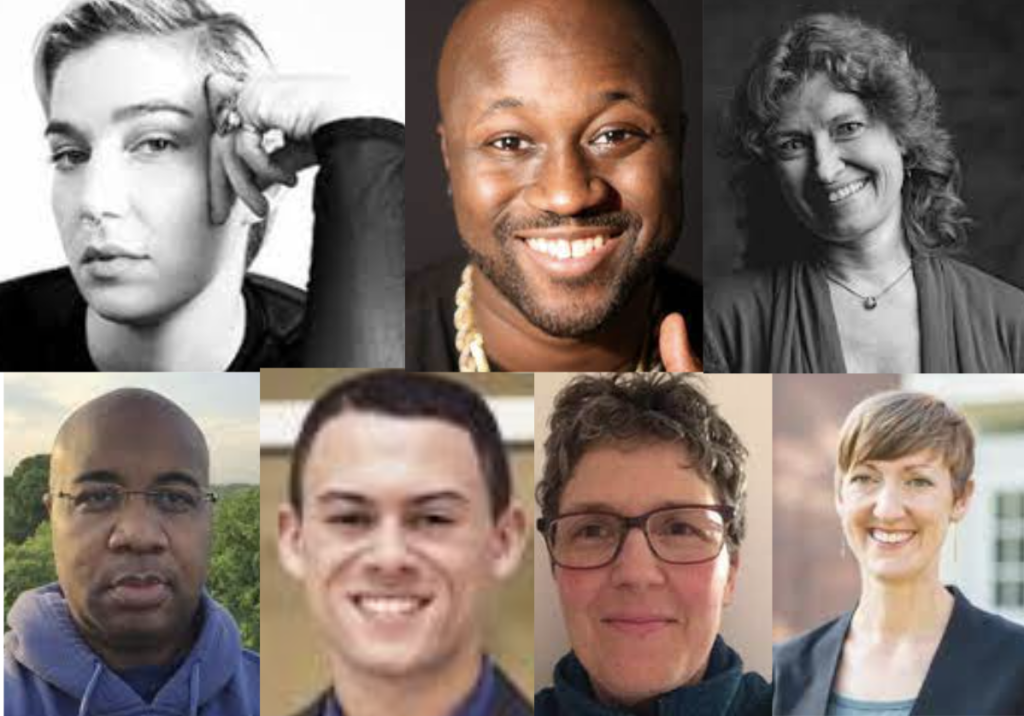The Creative Wire
Echoing through Pipes: A Podcast on Teaching Mindful Singing
Details about the inspiration and process behind the Prison Pipes Project, a Launch Grant funded workshop and podcast exploring mindful breathing, singing, and their healing effects.
October 20, 2023 | by Maddalena Ohrbach
Edited by Carolyn Dzul
The goal was never to teach but to open a door. Trauma has a way of making the body a terrifying place to live. To me, healing is a practice of finding ways of moving the body through, rather than around, our roadblocks within our own time and space. Healing takes as many forms as there are people in this world. In this way, breathing and singing are akin to healing: making music with the bodily reflex needed for survival, producing a sound unique to one’s own body, and embracing wherever one is at.
As a singer, I have always been fascinated by how my craft depends on something so mundane as air in our lungs. Having been raised in the Theravada Buddhist tradition, I felt compelled to combine my singing and mindfulness practices. Growing up, I loved how singing brought spirits and personalities together, how the vibrations in the room multiplied the energy, and how the joy and curiosity of singing made a kind of magic. Singing could feel like the most liberating, empowering hug given and received. What a special kind of self-acceptance, even just in that moment, to be in the body safely and joyfully, where any idea of ‘I can’t sing’ is no longer important. Here, in this concept of singing, this project was born, and I began a journey towards exploring accessibility through singing and mindfulness.
While volunteering with mentorship nonprofit Thread Baltimore during my freshman spring at Peabody, I was given a copy of The Master Plan, a memoir by ex-convict and activist Chris Wilson who shortened his own life sentence against tremendous odds. Our society’s penal code operates with an inhumane ignorance towards crime’s underlying issues of mental health, institutional racism, and systematic oppression. And yet, Wilson needed only a stack of books and some encouragement to find his own way out; perhaps the most basic tools could free minds and souls.
Singing had always been important and freeing to me. But I knew from my time in a music conservatory as well as in the world at large that there exist so many constructs around ‘correct’ or ‘beautiful’ singing. Because of this, many people are scared to sing because they think they can’t or shouldn’t. I wanted to deconstruct that narrative and offer guidance in mindful breathing and singing rooted in the body, not in thoughts or judgments.
In 1989, Fleet Maull founded Prison Mindfulness Institute while serving a 14.5-year sentence in federal prison, offering meditation resources to inmates as a healthy, nonviolent coping mechanism. In 2010, Zoe Boekbinder began the Prison Music Project to record songs and raps written by inmates, and two years later, spoken-word poet Phil Kaye gave a TedTalk about teaching poetry in maximum security prison. In 2014, nonprofit Musicambia started offering musical instruction and loaned instruments behind bars, and in 2016, singer Joyce DiDonato partnered with Carnegie Hall to perform the works of inmate composers at Sing Sing Correctional Facility. For years, artists, mindfulness practitioners, and teachers have been advocating for the mental health and creativity of humans kept behind bars, and this activism has inspired me enormously.
After learning about these advocates, the Prison Pipes Project began. With help from Professor Christina Manceor, I designed a project to offer singing workshops in a prison, focusing on the foundation of mindful breathing and bodily awareness. A few years back, I’d taught several workshops in a monastery amongst my friends and mentors, which informed the workshops’ structure: they’d begin with meditation to center the body, then transition into humming, improv exercises, and songs to be sung in a round. I planned for five workshops, to allow for relaxed learning and check-ins, and at the end would gift all participants with sheet music and other materials to support continued practice.
Initially, I planned to collaborate with Dr. Stanley Andrisse of Prison Cells to PhDs (P2P), a nonprofit offering college education and socio-emotional education to inmates. Though plans looked promising in spring 2021 and the following autumn transitioned further to in-person services, COVID-19 was still disproportionately infecting prisons at dangerous rates, making for a mutually risky situation.
Thankfully, the support of Peabody’s Launch Grant helped me pivot. I realized that anyone could benefit from the workshop, but I felt moved to focus on at-risk, vulnerable communities. Why? While aware of potential savior-complex undertones, I wanted to prioritize those whose circumstances are often stigmatized, because they may struggle to feel worthy of healing and therefore lose motivation to seek help. Just as books had opened a door for Wilson, I wanted to offer an opening to those who might not know it existed. Even the simple awareness that our breath can center us, that singing or humming can release tension and connect us back to our bodies: this is a valuable tool that everyone deserves to know.
My pivot began by reaching out to halfway houses, which are centers helping addicts, prisoners, and psychiatric patients adjust to life in general society. Amidst this process, Martha’s Place warmly welcomed me to teach through their recovery program for women overcoming drug addiction and homelessness. Of course, with imposter syndrome, I wondered, who was I to offer meditation resources and singing? What if I retraumatized them with all the bodily awareness? How could I go about this thoughtfully?
Throughout my senior year at Peabody, I gathered wisdom from those in my network to educate myself in the many considerations and precautions straddling the mindfulness and music worlds. These interviews went from being a literature review to an imposter-syndrome-antidote and ultimately became the bread and butter of my project. To shout out with gratitude for the generous people in my life who offered their invaluable ideas: Aaron Young (my high school choir teacher), Born I Music, aka Ofosu Quartey-Jones (lifelong mentor, dharma teacher, and hip-hop artist), Dr. Laura Martocci (my auntie and a sociologist), Dr. Beth Willer (my choir director at Peabody), Dr. Louise Ferretti (my mother, a pediatric neuropsychologist), Zoe Boekbinder (creator of Prison Music Project), Trellis Stepter (mentor and friend), and many more whose thoughts refined my project. These interviews helped me build a road map, especially in how I explained and dispelled common misconceptions about correctness and inclusivity in mindfulness and singing.

From top left clockwise: Zoe Boekbinder, Ofosu Jones-Quartey, Laura Martocci, Beth Willer, Louise Ferretti, Aaron Young, Trellis Stepter
I facilitated two mindful singing workshops at Martha’s Place: they took place joyfully, and with recording permission, I was able to capture the spirit of the second workshop. Though it was startling for me to transition from conservatory student brain to workshop facilitator, the participants helped me feel right at home. Some arrived early, others within the last ten minutes; some wore workout gear or work uniforms, others wore their Sunday best, and one wore a tutu. Nearly everyone was exhausted, coming from work shifts or errands or other support groups, yet they collectively brought in a contagious curiosity and offered good-natured laughter at themselves and each other throughout the workshop.
Afterwards, one participant came up to me and shared what the workshop meant to her:
“Whenever people talk about singin’ it’s always…I can’t sing! That’s the first thing people always say…but it’s really not about singing, it’s just about like, being free with it. It was fun. I had a nice time… anyone can sing, really.”
She had beautifully summed up my intentions for the project: this participant felt included, valued, and encouraged to sing not to create a ‘beautiful’ sound but to be real, present, and open. Many other women echoed her sentiment, and expressed their surprise that singing can be fun, and lightening, and welcome in their minds and bodies. Their excitement at realizing that if they could breathe, they could sing—it was palpable.
In May, with recordings compiled and GarageBand open, I set out to create a podcast. As I edited, it came to be less about my project and more about the principles and process of this vein of work in general, which I hope will encourage and guide those who—like me—are curious but unsure where to start. As themes became clearer, I sorted interview snippets under those headings and wrote and recorded a script to guide the listener through. I polished off the podcast with music, and after peer-edits I finished 10 episodes amassing an hour and ten minutes.
I kept the name ‘Prison Pipes’ because in the end, the project is meant to serve those who may feel imprisoned by their circumstances and remind them of the air and voice in their pipes/throats. Healing and self-care shouldn’t be a luxury. It should be accessible and practical and universal. Though many of the Martha’s Place women had sung before in church choir or middle school, this approach to mindful singing without judgment seemed to show them something new, and in turn, they found something therapeutic, artistic and exciting within themselves. Breathing and singing are always within us, and I hope the podcast inspires other artists and teachers to explore this line of work in new places.
——————————————————————————————————————-

Maddalena Ohrbach
Voice Performance
BM 2022

Maddalena Ohrbach is a singer and multidisciplinary artist from Buffalo, NY. She studied voice at Peabody as the grateful recipient of the Rosa Ponselle Scholarship; she has since taught math at a charter school in Boston and is now a graduate student in Montreal.
IG: @maddalenaferretti